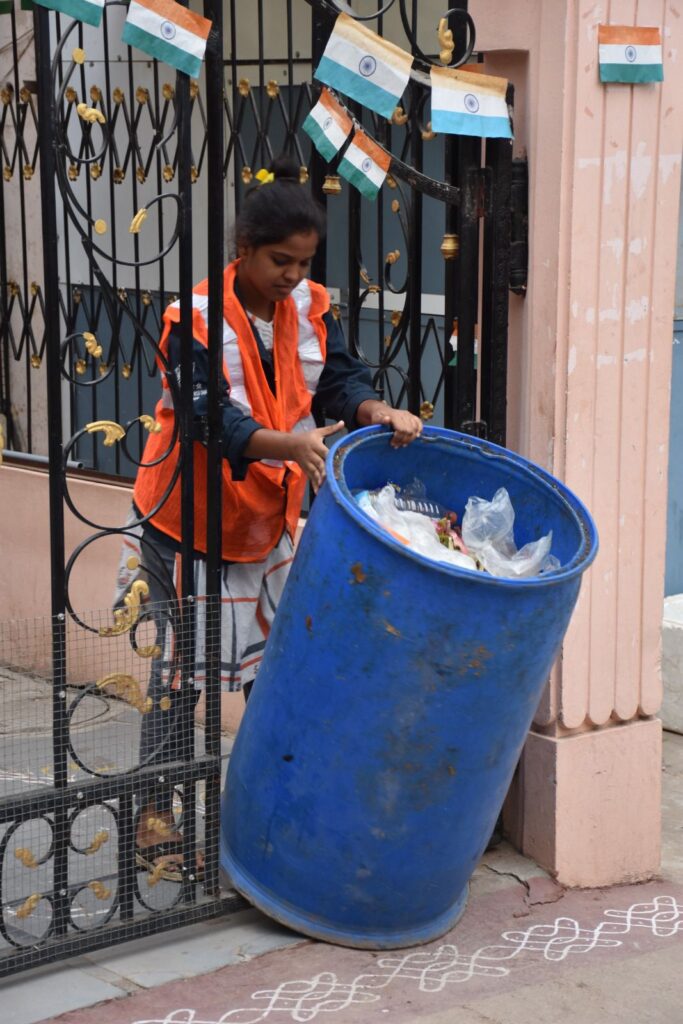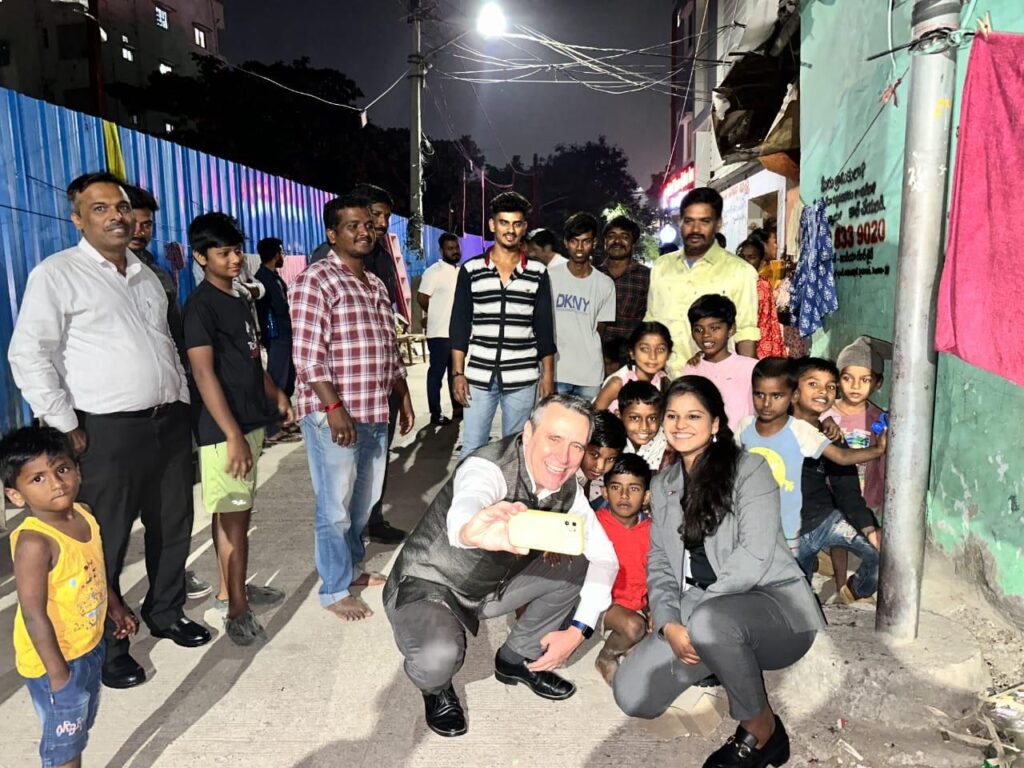Representing children and families from marginalised backgrounds—especially those from the Dalit community and unorganised sectors—she speaks of how deeply rooted stigma shaped her identity, and how she has worked to transform it into a platform for change. In an exclusive chat with The Pioneer, 21-year-old Jayalaxmi Aripina, a student and the Prime Minister of the World Children’s Parliament, shares her journey of rising from the garbage grounds of Hyderabad to becoming the voice of her community

Needhi Gattani
In a world where caste, class, and gender still define whose voices are heard and whose are silenced, where prejudice buries dreams before they can be spoken, one young girl rose from the margins—unafraid to challenge the narrative forced upon her. From the garbage grounds of Hyderabad emerged Jayalaxmi Aripina, the daughter of a Dalit garbage collector, who turned a life of imposed invisibility into one of purpose, pride, and power. Now 21, a student and the Prime Minister of the World Children’s Parliament, Jayalaxmi speaks not just for herself, but for an entire community that has long been unheard. In an exclusive chat with The Pioneer, she shares her journey—of pain, resistance, and transformation.
Everything started when she was 11 years old and realised that her parents worked as garbage collectors. Coming from a garbage collector background, people often tended to call her names—“garbage girl”—which she didn’t like. Although her parents weren’t educated, she always wanted to get out of the house and use her time to learn something new. “My mother has always been supportive,” she says.
All this motivated her to join the non-profit Montfort Social Institute at the age of 13. Her biggest motivation, she shares, “was to represent my community, make the voice of my community heard, and solve their problems.” By the age of 14, she was elected as Prime Minister of the Hyderabad city-level children’s parliament. As the PM, she addressed multiple issues like mosquitoes in slums and breakfast for Anganwadis.
“To address the mosquito issues in slums, I first proposed that the GHMC take action. The proposal was a huge success and the authorities conducted fumigation drives,” she recalls. “The request to provide breakfast at 56 Anganwadi and 21 new Anganwadi came in second and it was granted, becoming public policy. This is where it all began.”

Being the PM of the children’s parliament has taught her that background isn’t essential. She emphasises the need to represent at a bigger level: “I can publicly talk about myself and represent my community on a national scale, educating others about the importance of our work.”
One’s drive for change shapes their journey. Jayalaxmi worked at MSI (Montfort Social Institute) while studying. Her time at MSI has shaped her upbringing. “I read many newspapers and took part in many competitions like essay writing and public speaking. I also read a lot about caste, personality, and English speaking, but most importantly, my drive to work hard has improved me as a leader,” she recalls.
Growing up as the daughter of a garbage collector, she had to overcome a lot of social stigma that was often attached to her identity—being called a “garbage girl,” being a girl in society, and being expected to get married eventually. Although she considers herself lucky to have found the right mentors, she says, “NGO founder Brother Varghese helped me overcome societal stigma and other challenges in my life. They have assisted me in voicing my views and speaking up for my community on many issues.”
Some impactful projects and policies that have been implemented through her leadership in the Hyderabad City Youth Parliament include policy reforms. For example, the breakfast program that the previous government implemented has been halted—she wants to bring it back. She also wants to fulfill the garbage collectors’ requests, such as providing them with safety gear. Since dump yards are extremely dangerous and many children who work there need to be safeguarded, she is also suggesting that specific scholarships be made available for the children of garbage collectors and that vulnerable children in these sectors be protected. Above all, she aims to establish a forum for unorganised workers to voice their concerns.
“Children’s Parliament has acted as a model of participatory democracy; this platform has influenced local governance and national policymaking,” she says. “This is a type of government social critique where a group of roughly thirty kids discuss issues in their community, such as drainage, garbage, and sanitation, and then choose three main issues to tackle each week. Youngsters are taught how to participate in civic society, write petitions, and approach relevant authorities. They gain leadership and competence, and as they grow, their motivation to bring about change in society is reflected.”
Jayalaxmi also got an opportunity where she was selected as a Gandhi-King Scholar and travelled to the U.S. The program was to honour Gandhi and Martin Luther King. “My takeaway was that we need to deal with societal problems based on their value, which is through peace and being a support system together. And through collaboration and networking, we can bring in collective change.”
She was super happy as she was travelling overseas for the first time. Being a girl coming from a Dalit background, it was hard for her to process. Although she realised that wherever you are in the world, names can be different, the pain is the same. “I was there for 15 days and realised that we are pretty much facing the same problem—like how there are caste problems in India, there’s racism in the US.”
She has led sanitation and education initiatives in over 50 slums across Hyderabad. Success like this comes along with a lot of challenges, where authorities often fail to respond properly and gender discrimination exists, where she was often told, as a girl, that she was unfit for a job. “When we put forth an effort and the authorities don’t return the same, I feel bad. It hurts a lot when I approach someone in a position of authority with my problems, and you don’t even listen. We will be inspired to work harder if our efforts result in progress, but many won’t even be willing to listen or bother.”
“When change is required, you need to get other young people from marginalised communities to believe in their potential to lead.” Her mother would advise her to become a constable when she told her that she aspired to become an IAS official. Why? Because her mother believes, “only the wealthy could afford it.” Jayalaxmi believes their aspirations are constrained because of their financial situation.
“I believe that students should never undervalue their potential in the first place. Self-blame and poor aspirations are, in my opinion, an international crime. A lot of people give up before they even start. You must accept that society is two-dimensional—if you are subjected to caste prejudice on one side, some will support you in opposing it on the other. They must understand that even if 9 out of 10 people don’t reply, there’s one who will listen and understand.”
For her, becoming an IAS officer is not just for the title, but to change how the system sees people like her. She wants to use her position to ensure that children like her receive an education. She wants to eradicate a low-aspiration mindset. She believes it is not a lack of talent or money that prevents people from her background or the unorganised sector, but rather a lack of motivation.
“I want to establish a platform for women’s safety, healthcare, and education. I would like to make it clear to everyone that girls are capable of much more than just getting married. Basically, as an IAS official, I wish to bring about these changes through proper policies and implementation. I also want to ensure that no child has to face the same difficulties that I had.”
It is difficult to change the mindset of people and to break stereotypes about the community; however, after her US program, they now see that it can help bring the necessary change in their lives and community. She also recalls an incident that happened after: “When an article about my work was published, a lady I had worked for recognised me and spoke about the work I do. She was always indifferent towards us, but that day she tried to understand our problems, even asking for a hug and cried. She was genuinely kind to us that day. This showed me that the work I do will help hundreds like me break barriers and stereotypes linked to us.”
“My biggest inspiration is Dr. B.R. Ambedkar, whose quote, ‘Life should be great rather than long,’ is also my motto in life.”



